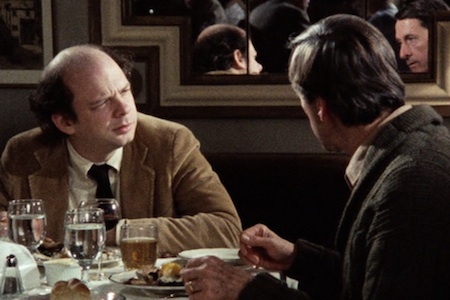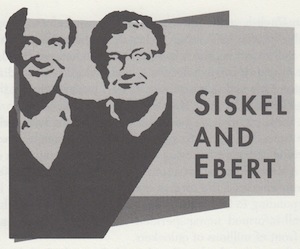
Gene Siskel
Born: January 26, 1946, Chicago, IL
Died: February 20, 1999, Evanston, IL
Roger Ebert
Born: June 18, 1942, Urbana, IL
Died: April 4, 2013, Chicago, IL
They are the most recognized, the most watched, and the most influential critics in the world.
—Donald Liebenson
Editor’s note: This final essay in our series of pieces republished from the 1998 book The Film 100, pays tribute to the Roger Ebert of the critic’s ‘Siskel & Ebert’ days. In the 15 years since this essay was first published, Roger Ebert evolved with the times and moved from his association with Siskel and television into social media and other realms. We publish this final essay, with a few changes in tense, a little over a week after Roger Ebert’s death and on the day his Ebertfest opens in Illinois.
Born on Chicago’s north side, Gene Siskel graduated from Yale and joined the Chicago Tribune in 1969, when journalism was in its heyday and the “American New Wave” was taking over cinema. Films were suddenly very hot, and papers were leaning toward first-person opinions. After the success of Judith Crist at the New York Herald-Tribune, it suddenly became fashionable to have dedicated film critics rather than gossip columnists covering the arts. Siskel became the Tribune’s film critic with a twice-a-week column, which has lasted more than nineteen years. In 1975, WBBM-TV introduced his opinions to television audiences.
Later that year, a local TV producer capitalized on a crosstown rivalry between Siskel and a newspaperman from the Chicago Sun-Times as the basis for a new kind of television show. Roger Ebert, who had recently become the first film critic to win the Pulitzer Prize for Distinguished Criticism, would share his opinions on newly released movies with Siskel during the half-hour program.
A product of Urbana, Illinois, Ebert began a newspaper career at age fifteen as a sportswriter and worked his way through school. He was a Ph.D. candidate in English at the University of Chicago before dropping out to become a film critic in 1967, when he began reviewing films for the Chicago Sun-Times. Before joining the television show, he had produced a 1973 TV special, The World of Ingmar Bergman, and had also followed in the footsteps of James Agee and other critic-screenwriters by scripting the cult film Beyond the Valley of the Dolls (1970).
Together, these experienced journalists picked apart movies and each other at the same time. The show struggled at first, but through appearances on public television, it built a following among those yearning for a critical film vocabulary. A slew of copycat programs followed in the early 1980s. Although many of them emulated the format exactly, viewers remained loyal to the original, responding to its authentic feel. In Siskel and Ebert, they saw two genuine, well-informed newspapermen energetically defending personal opinions in front of millions of onlookers.
The “thumbs up, thumbs down” trademark that embodied the sum of their comments didn’t appear until 1986, eleven years into their partnership, but the famous signal, conceived by Ebert, quickly became the gauge that millions looked for in advertisements. The power of their thumbs still frightened studios at the time of this writing; those simple gestures could make or break a movie’s opening-week receipts. Many studios locked S&E out of advance screenings and refused to provide the show’s producers with movie clips or trailers, giving up national exposure to avoid receiving a disfavorable digit.
Their influence also saved some films from premature death. Documentary filmmaker Errol Morris benefited from the attention they gave his offbeat Gates of Heaven (1978) when most of the mainstream media did not even review his film. Director Louis Malle’s intellectual My Dinner with Andre (1981), from a script by Wallace Shawn, was having trouble holding theater bookings until Siskel and Ebert gave it “two enthusiastic thumbs up”; it added additional showings and eventually had nine hundred playdates nationwide. Billy Bob Thornton got a career boost when the critical pair pointed to his excellent script for One False Move and his stellar work in Sling Blade, a film headed straight for video that went on to earn Thornton an Oscar.
The weekly broadcast also provided the critics with a platform for championing the merits of such technologies as laserdisc and digital videodisc (DVD). They were instrumental in educating the public about the ongoing efforts to preserve classic films, and they used their show to draw support for the fight against film colorization, often hailing black-and-white films in special editions of the program.
The continued expansion of their influence was astounding; Siskel provided film criticism on the CBS This Morning program, and Ebert posted his electronic reviews for millions online. Both men had their columns nationally syndicated in more than three hundred combined newspapers. The various film books of Roger Ebert alone have sold more than seven hundred thousand copies.
At the time of this writing, the show went into its twentieth season and was the winner of five Emmy Awards, aired on 180 U.S. stations and the straightforward commentary of the bickering Midwesterners was reportedly broadcast to a staggering 95 percent of all television sets in the nation.
To read all the republished articles from ‘The Film 100,’ go to Reintroducing the Film 100 here on Keyframe.




